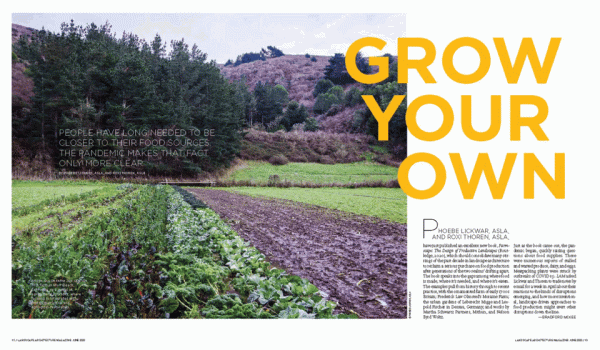Associate Professor Phoebe Lickwar Featured in Landscape Architecture Magazine

Associate Professor Phoebe Lickwar recently co-authored a book with University of Oregon Landscape Architecture Associate Professor Roxi Thoren titled Farmscape: The Design of Productive Landscapes (2020). The book situates agriculture as a design practice, and uses a wide range of international case studies and analytical essays about how landscape architects can integrate agriculture into their designs.
The book was featured in the June 2020 issue of Landscape Architecture Magazine along with a dialogue between Lickwar and Thoren about their reactions to the kinds of disruptions in food supplies caused by the pandemic, and how more intentional, landscape-driven approaches to food production might contribute to a post-COVID food system.
Some highlights from the article:
- “The pandemic is making it very clear how fragile certain aspects of our food system have become/The broken food supply chain…has definitely opened the door for an expansion of local markets and direct farm-to-consumer food sales. Here in Austin, as elsewhere in the country, we’ve been huge increases in online purchasing and delivery of locally farmed food. People are turning to what’s available, and it’s local and seasonal. But there’s not enough to go around, and given the state of income inequality in this country, it’s affordable only to some. It makes me wonder if now is the time when we finally get serious about urban agriculture. I never dreamed it would take a pandemic but here we are.”
- “We need to move beyond conceptions of the city that position food-producing landscapes as somehow separate from other kinds of urban landscapes. In the book, we examine ways landscape architects have integrated agriculture in contemporary projects—within a university campus (Shenyang Architectural University), a Buddhist practice center (Green Gulch Farm Zen Center), and a housing development (Village Homes)—to support and reinforce education, conservation, and the building of community.”
- “These kinds of hybrid agricultural landscapes provide local access to food, but they also push the boundaries of our assumptions about urban space. We have come to accept that urban landscapes will not sustain us, that crops and campuses do not belong together, that agriculture is to be found only in the community garden, or beyond the boundary of the city on rural lands. But these new forms suggest otherwise. They provide liberating models for ways to design an agricultural city, as opposed to an urban agriculture.”
For the full conversation, check out the June 2020 issue of Landscape Architecture Magazine, and learn more about the book Farmscape: The Design of Productive Landscapes here.

